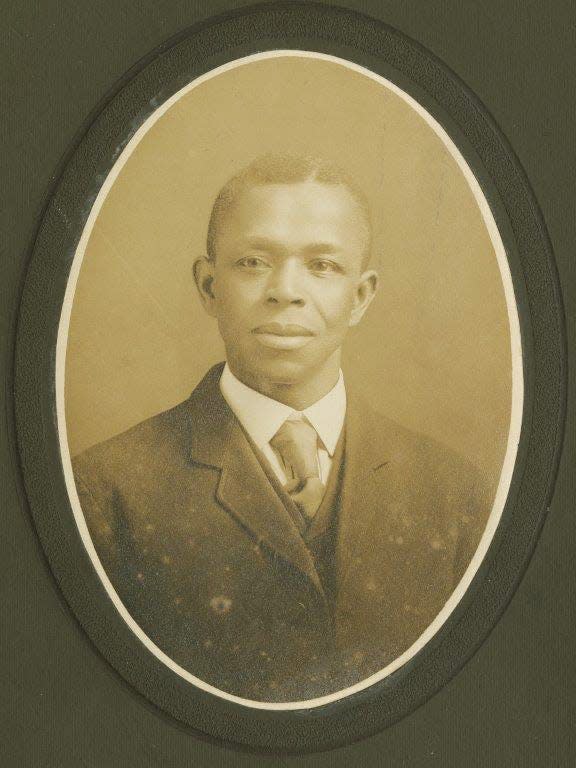What Bloomington streets are named after local Black leaders?
- Oops!Something went wrong.Please try again later.
Editor's note: In honor of Black History Month, The Herald-Times is publishing Black stories, both current and historical, throughout the month of February. Look for them on weekdays. Send your feedback and suggestions about this series to rksmith@heraldt.com.
Like many counties across the country, Monroe has an eclectic array of street names. Some are so iconic they're synonymous with the area itself, such as Kirkwood Avenue. Others border on ridiculous — Popcorn Road, Lookout Lane, Sunday Drive. Then, of course, there's That Road.
Other roadways have the heavy responsibility of carrying on someone's legacy. Some local roads are named after historic figures who made their mark in the area like the Faris family or the Covenanter Church. Here are a few streets named after prominent African American leaders of the distant and recent past.
From the archive:Column: Where the streets have our names
Samuel Dargan Way
The block of Indiana Avenue between Third and Fourth streets, right where IU Maurer School of Law resides, was designated Samuel Dargan Way in 2018 as a way to commemorate the prolific alumnus whose work and community service went above and beyond.

In 1909, Samuel Dargan became the first African American graduate of Indiana University School of Law. Finding that the law field provided him little opportunity outside academia, he took up a position as an assistant law librarian at IU soon after graduation. When he assumed the role of law library curator in 1924, he struck up easy camaraderie with law students, who would all go on to affectionately call him the "father of the IU Law School." In a separate venture, Dargan ran his own business selling law books to students.
Beyond his IU position, Dargan strived to ease the burden of university life for Black students. While IU's dormitory system was closed to Black residents, Dargan purchased several properties near campus and opened boarding houses for these students to live together. He operated the first residence hall for female African American students and leased a house to Kappa Alpha Psi, a now nationally recognized Black fraternity that began at IU.
Dargan retired from his law library post in 1948 and died six years later at the age of 84; he is buried in Rose Hill Cemetery.

Eagleson Avenue
Before it was christened Eagleson Avenue, this road's naming journey took a detour.
The street was once named after David Starr Jordan, a former IU president whose influential work in Bloomington and the greater scientific community has taken a backseat to his set of problematic beliefs. While he was a premier ichthyologist and guiding hand to IU's early growth, Jordan was also a prominent advocate of eugenics, an ideology that claimed society could be improved through selective breeding of human beings. Once accepted as mainstream thought during Jordan's lifetime, it is now widely reviled as a racist and ableist pseudoscience. In 2022, city and university officials agreed to rename the avenue after the Eagleson family, which has deep ties to both Bloomington and IU.
Making change:David Starr Jordan's mark on Indiana University's campus remains in unexpected ways
The family's patriarch, Halson Vashon Eagleson Sr., was born into slavery in 1851. He later moved to Bloomington in the 1880s, where he would first make the Eagleson name known through his prolific work as a barber. He quickly found his footing through community. He was a co-founder of the Bethel AME Church in Bloomington and an orphanage in Unionville.
Halson's six children would all go on to attend Indiana University.
His oldest, Preston, graduated from high school in Bloomington at the age of 16 in 1892 and became the first African American to take part in intercollegiate athletics at IU. Preston's son, Wilson Vashon Eagleson Sr., followed in his father's footsteps by obtaining an undergraduate degree in 1922. Wilson went on to marry Frances Marshall, who was the first black woman to graduate from IU. Marshall's own long career in academia is immortalized at IU through the Neal-Marshall Black Culture Center.

David Baker Extension
As part of the Jordan Avenue renaming process, the Indiana University Board of Trustees unanimously approved renaming the extension after jazz musician and music educator David Baker. Baker, who died in 2016, was a prominent performer and IU professor who went on to found the university's Jazz Studies program.
Baker was a virtuoso whose work would lead him to be nominated for both a Pulitzer Prize in 1972 and a Grammy in 1979. His work would also secure him an Emmy award for his score of a 2003 PBS documentary. By the end of his life, he had more than a thousand compositions to his name.
After receiving both his bachelor's and master's degree in music education at IU, Baker returned to his alma mater as an educator at the school of music in 1966. As the founder of IU's Jazz studies program, Baker inspired countless budding musicians and composers throughout several generations.
This article originally appeared on The Herald-Times: Black Indiana University leaders' legacies carry on through streets

